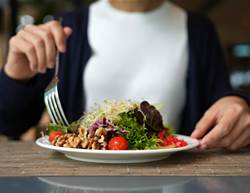Seed oils have been a hot topic in Australia’s health and wellness circles, with some influencers and nutrition advocates claiming they contribute to inflammation and chronic disease. As ultra-processed foods continue to dominate supermarket shelves, many Australians are questioning whether the oils commonly found in these products pose real health risks.
Now, new research published in the journal Gut suggests that ultra-processed foods may contribute to inflammation in colon cancer tumours, raising concerns about their potential role in cancer development. Some have taken this to mean that seed oils—commonly found in ultra-processed foods—cause cancer. However, that’s not what the study concluded.
Here’s what the research actually found, plus what cancer experts recommend based on the evidence.
What did the study find?
The study, published in Gut, examined how fats (also known as lipids) interact within the micro-environments of colon cancer tumours.
Researchers analysed colon cancer tumours from 81 people using a specialised tool called a mass spectrometer, which detects different types of lipid mediators—fats that help cells communicate and are largely influenced by diet.
The key findings:
• Nearly all lipid mediators in the tumours belonged to a pro-inflammatory class of fats, including omega-6 fatty acids. (Chronic inflammation has been linked to various cancers, including colon cancer.)
• The lipid mediators appeared to suppress the body’s immune response around the tumour, making it harder to fight off cancer cells.
• The study suggests that eating ultra-processed foods may promote lipid mediators that weaken immune defences, allowing tumours to grow unchecked.
“Instead of fighting off [tumour cells], the immune system may become suppressed or incapable of normal immune surveillance,” explains professor of surgery, Dr Timothy Yeatman.
Does this mean seed oils cause cancer?
No, seed oils do not directly cause cancer, says Dr Yeatman. However, he explains that omega-6 fatty acids—which are abundant in seed oils—could contribute to chronic inflammation and immune suppression if consumed in excessive amounts. “When omega-6s replace omega-3s in a 15-20:1 ratio, it may create an inflammatory state that weakens the immune response,” he says.
The bigger concern, Dr Yeatman explains, is an imbalance between omega-6 and omega-3 fatty acids. Omega-3s have anti-inflammatory properties, and an excessive intake of processed foods high in omega-6s may prevent them from functioning optimally. This imbalance could make it easier for harmful mutations to develop, rather than being destroyed by the body’s natural defences.
The issue is less about seed oils alone and more about the overconsumption of ultra-processed foods, says surgical oncologist, Professor Anton Bilchik. “There is increasing evidence that a diet high in processed foods raises the risk of colorectal cancer,” he says.
Medical oncologist Dr Wael Harb agrees, noting that research links ultra-processed foods to a higher risk of colon cancer and a weakened ability for the body to fight disease.
That said, doctors emphasise that diet is just one factor in cancer risk. “Genetics, family history, age, smoking, alcohol consumption, physical inactivity, and obesity all play a role,” says Dr Harb. Reducing the risk of colorectal cancer requires a holistic approach, addressing lifestyle, diet, and overall health habits, he says.
Are seed oils bad for you?
Not necessarily. Health organisations, including the Heart Foundation, recognise that seed oils can be part of a balanced diet. In fact, research suggests that polyunsaturated fats—including omega-6 fatty acids found in seed oils—may help lower bad cholesterol and reduce the risk of heart disease and stroke.
A 2017 scientific review found that linoleic acid (a major omega-6 fatty acid) did not significantly impact inflammatory markers in the blood. A 2023 study in the International Journal of Molecular Sciences also linked higher omega-6 levels to better cardiovascular health and improved glucose metabolism.
Meanwhile, a study published in the British Journal of Nutrition found that linoleic acid may lower the risk of cardiovascular disease and type 2 diabetes.
What doctors suggest taking away from these findings
Cancer specialists agree that minimising ultra-processed foods is a good step for overall health and disease prevention. If you’re looking to reduce your risk of colorectal cancer, Dr Harb recommends focusing on whole, nutrient-rich foods, such as:
- vegetables
- fruits
- whole grains
- legumes
- nuts
- lean proteins like fish and poultry
It’s also wise to limit red and processed meats, sugary foods and ultra-processed foods, Dr Harb says. If you’re concerned about balancing omega-6 intake, reducing processed food consumption while increasing omega-3-rich foods may help. Sources of omega-3s include salmon, sardines, mackerel, trout, oysters and mussels.
If you have a family history of colorectal cancer or concerns about your personal risk, speaking with a healthcare professional is essential. Your doctor can provide individualised recommendations and advise whether earlier or more frequent screenings may be necessary.










